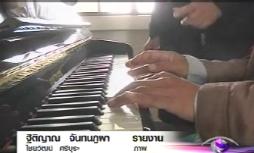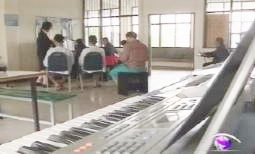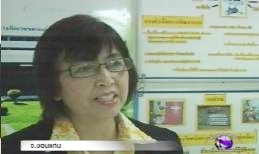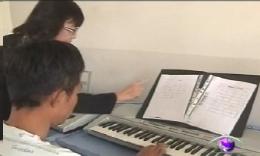Khon Kean Rajanakarindra Psychiatric Hospital in Thailand’s northeastern province of Khon Kean offers psychotic patients piano lessons along with the usual range of treatments in order to help them build relationships with others for other types of treatment in the future.
Patients at the hospital usually gather and practice the instrument carefully. Despite the absence of musical backgrounds for most, they can play music by applying the “One-to-Five” technique, which converts the musical notes into the numbers 1 to 5. The technique, which is applicable for use on inexpensive keyboards, helps patients play the piano more easily in a short time and without pressure.

According to the hospital’s expert nurse, Mallita Poonswad, playing the instrument gives positive results to patients suffering from various kinds of mental illness.
“The nature of these patients is that they’re inert, don’t really care about themselves and are usually lost in isolation,” Mallita said. “But piano helps them concentrate better, as the sound of music helps their minds stay fixed on the notes or the numbers assigned to them.”
Psychotic patients receiving musical treatment must volunteer to join this practice in groups of 6-12 persons. They must be able to communicate with others and their minds must be calm enough even though their general symptoms are chronic.

Treatment takes place three times a week, lasting an hour for each session. Sufferers are taught to use both hands to play the music, while applause and compliments are given to the patients to boost their morale, even if they are not expert performers. Each practice is recorded during the treatment in order to be evaluated musically for the patients’ progress.
According to social worker Nuanlak Laohapan at Khon Kean Rajanakarindra Psychiatric Hospital, psychotic patients suffer from a disorder of their brain chemicals and of neurotransmitters.

“What we do helps the patients’ brain with exercise together with medication. After four months of practicing the musical skills, patients will be stimulated more easily and their symptoms will improve when they’re asked later to join other hospital activities,” Nuanlak said.
She added that music positively affects brain relaxation and the playing therapy technique helps entertain the patients, make them happy and acquire their better self-esteem.
One patient in the hospital programme said, “If we play well and let our brains exercise, then we keep on playing and playing, and that makes us happy.”

The “One-to-Five” technique is not difficult. Persons at any age can begin the practice. Music therapy can also be used to help cure other types of patient behaviours such as children with autism and ADHC (Attention Deficit Hyperactive Disorder), and with the elderly as well as persons with depressive disorders. (MCOT online news)





